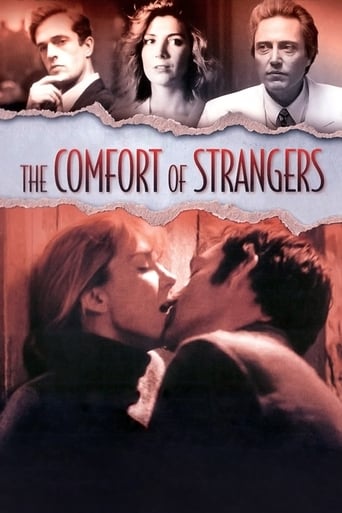

One naturally expects nothing less than that when one watches a Harold Pinter screenplay turned into a film. If you are not familiar with Pinter's plays then you might be with his screenplays The Servant (1963), The French Lieutenant's Woman (1981) and Sleuth (2007). Pinter's most prominent trademark is his ability to render his screenplay adaptations completely independent of their original text. In other words, his Pinterisque touch does not transform but rather creates anew.The Comfort of Strangers (1990) is based on the Ian McEwan's novel of the same name. Basically, the story is about Colin and Mary, a young couple who travel to Venice on a vacation to think about their future together. In Venice, they encounter an older couple, Robert and Caroline, who eventually turn their vacation and relationship upside down. I do not want to rant about how different Pinter's screenplay is from McEwan's novel. This is a closed deal. What strikes me as supremely beautiful is how Pinter manages to bring to light such psychological intensity and incendiary conflicts using the subtlest language imagined. It is almost like watching poetry in motion if that makes any sense.It is out of the question that Pinter would not have accomplished that effect without Paul Schrader's exquisite talent, who is a screenwriter himself by the way (does Taxi Driver and Raging Bull ring a bell?). Schrader succeeds in giving Pinter's world the required mystical substance; the long and medium shots of the charming Venice, the camera pauses, the movement of actors, the choice of subliminal music it all contributes to creating this metaphysical atmosphere felt only in classic paintings. Have you noticed the similarity between shots of Mary and Colin in bed and the paintings adoring the walls of Robert's apartment? You're welcome.The gender and power conflict that takes place in this kind of world is all symbolic and is expressed in allusions rather than direct words. Colin, played to good effect by Rupert Everett, is meant to be beautiful in picturesque way akin to that of Greek statues. His beautiful masculinity is to be contrasted with Robert's (played by the genius Christopher Walken) grotesque masculinity. Same can be said about Mary (Natasha Richardson) and Caroline (Helen Mirren) who represents two different aspects of femininity: passivity and servitude. The encounter between the young couple and their older counterparts might seem a little bit awkward in realistic narrative terms. Like seriously, who would go sleep at a strangers' house and let them take their clothes away? However, in symbolic terms, this confrontation is necessary to highlight the gender fluidity and power conflict in any relationship. Robert and Caroline are the distorted mirror that Colin and Mary see themselves into. They see the dark side of who they are and their future demise. The image they see in the mirror terrifies them and subconsciously pushes them to change to the opposite – to exchange roles. Colin sees in Robert the extreme end of masculinity and power he has been trying to practice on Mary. He becomes threatened and retreats to his beautiful, feminine self (something that Caroline and later Mary keeps referring to). Similarly, Mary sees in Caroline the extreme end of her docility and indecisiveness. She also becomes threatened and embraces her masculine self. This subversion of roles is quite evident in Colin and Mary's later sexual encounters and fantasies.Whether this change was necessary or not and whether it has been brought about by the wrong catalyst (Robert and Caroline) or not are all questions Pinter leaves us with to ponder on. I do not care about the answers of those questions as much as I care about how enlightening and fascination watching this film has been.
... View MoreA young couple returns to Venice to rekindle their passion, but their fate lies in the hands of an old couple with malice in their hearts ...I've seen this many times and always thought it a great film. The story is adapted from McEwan, but I think he stole it from Don't Look Now, which is based on Du Maurier's short story.Four actors playing their parts brilliantly. Richardson is great as the middle class optimist, Walken is nicely sociopath, and Everett plays the weak narcissist. But the whole thing comes together with Helen Mirren's speech about women's play acting.Score by Badalamenti is amazing. Location amazing. And the ending is so cruel - this is a horror film, because it takes you through the looking glass to a world where malevolence rules and there's nothing you can do about it.
... View MoreThis served as both a tribute to star Natasha Richardson (whose life was tragically cut short last week at just 45 years old) and a belated one in honor of celebrated playwright Harold Pinter (here functioning as a screenwriter adapting somebody else's novel). Considered a psychological thriller although, for the most part, it plays like a drama with erotic undertones my decision to watch it on the day allotted to the former genre certainly paid off given the shocking twist ending. Being set in Venice, it also evoked strong memories of my memorable fortnight's stay there for the 2004 Film Festival. The film is arty and deliberately-paced, but intriguing (if hardly original) and exceedingly well-cast: Christopher Walken (often resorting to hamminess elsewhere, he is quietly chilling here), Richardson (beautiful, obviously talented and truly the image of her mother, Vanessa Redgrave) and Rupert Everett as the couple he ensnares (for kicks) and Helen Mirren as his seemingly reluctant but eventually revealed to be just as ruthless wife/accomplice. Director Schrader, of course, had started off as a writer himself and he wisely leaves the actors (and, by extension, the script) to their own devices. To get back to Richardson's death for a moment, a number of striking parallels are to be found in the film: the central couple are on a vacation (which is what she was doing at the time of her untimely demise), her character has two children (as she did in real-life), and the Walkens intended leaving Venice for Canada (the place of Richardson's fatal skiing accident)!!
... View More'The Comfort of Strangers' starts on a promising note. As the opening credits role, we are introduced to the names of a talented cast. Set in Venice, director Schrader maintains the mystery element. Venice looks beautiful but at the same time very secretive and haunting. The formidable cinematography and background score further stresses on this. Rupert Everett and Natasha Richardson act well but it is Christopher Walken and Helen Mirren who steal the show. The sexual tension is quite cleverly displayed as sex is a key element. However, it is the ending that is a big letdown.Spoiler: It is shown that Mirren and Walken's characters were sexually obsessed with Everett's Colin. So, why did they decide to kill him? I thought both of them wanted to have some kind of ménage-a-trois with him. That would have made more sense. Also, in the beginning, Mary and Colin, sleep in separate beds. Since they were lovers, why was that the case? Perhaps they were on the trip to find each other. It's suggested that Walken's character is of an Arabian background (the interior design of his house, his speaking Arabic to the people in the bar etc).Nonetheless, it is the ending that ruins the film. Some people compared it to Lynch's work but 'The Comfort of Strangers' is nowhere near any of Lynch's great works.
... View More